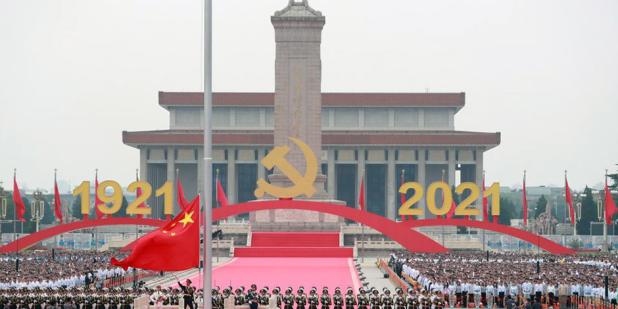Happy Lunar New Year from the USC US-China Institute!
The Party Throws Itself A Party

Subscribe to our weekly newsletter to get it delivered straight to your inbox!
This morning the Communist Party of China marked the 100th anniversary of its founding. Xi Jinping's speech today capped a series of events and programs affirming the Party's primacy. Xi asserted, as does the propaganda song from 1943, that "without the Communist Party, there would be no new China." He also insisted that China wouldn't be bullied and that those who tried will be crushed in a collision with "a great wall of steel made of the flesh and blood of 1.4 billion Chinese people." In keeping with the birthday party norm, the focus was on achievements and not the tragic consequences of earlier Party policies and practices or the many problems of today. In 1981, the Party acknowledged some of those errors. Today, the Party views attention to such things as "historical nihilism," an effort to denigrate its leadership. The Los Angeles Times reported this week on Party-State efforts to control the narrative.
The Party, of course, has much to celebrate. A small group of delegates from Party cells gathered with foreign advisers in Shanghai and then Hangzhou in the summer of 1921 in what is called the Party's first national congress. It was nearly eradicated several times, but seized control of China in 1949. Its policies in recent decades have invigorated what is now the world's second largest economy. China's people, on the whole, live longer and more prosperous lives. Next year, the Party is expected to hold its 20th congress. Last week we looked at the size and composition of the 95 million member Party today. Below are some of the films and other resources we've created or compiled about China's Communist Party.

1949, Soviet photographer; 2021, Xinhua photographer
Documents
At its 2017 congress, the Party amended its constitution to include "Xi Jinping Thought on Socialism with Chinese Characteristics for a New Era" as its guide for action. It adopted two centenary goals: by 2021 to achieve a moderately properous society and by 2049 to "build a modern socialist country that is prosperous, strong, democratic, culturally advanced and harmonious." Click here to see the Party's constitution.
In 2018, the Party dominated National People's Congress amended the country's constitution to remove term limits for the president (国家主席 state chairman) of China. This was widely seen as eliminating any awkwardness for Xi Jinping to continue in office. There are no term limits for Xi's other, more important, positions heading the Party and the military commission. In 2018, the NPC was headed by a member of the Party's Politburo Standing Committee heads the body. 73% of delegates were Party members. Article 1 of the Constitution makes it clear who is to be in charge: "Leadership by the Communist Party of China is the defining feature of socialism with Chinese characteristics. It is prohibited for any organization or individual to damage the socialist system." Click here to see China's constitution. China's issued White Papers on its political system. The non-partisan Congressional Research Service has also looked at China's system.
Assignment: China
Our multipart documentary series Assignment: China focuses on the journalists covering the remarkable changes in China since the 1940s. The correspondents interviewed influenced American understanding of China from the civil war of the 1940s through the Mao years, the Deng-era reforms and on to the Xi Jinping era.
Maoism at Home and Abroad
The Party-State and Chinese Society
Many of our conferences have included examinations of the Party's roles in China. In 2016, David Shambaugh, Mary Gallagher, Stan Rosen and Teresa Wright looked at politics in Xi's China. Ten years earlier, political scientists weighed in on prospects for political reform.
Xi Jinping's Remaking of the People's Liberation Army
China's New Governing Party Paradigm
Timothy Heath, Senior International Defense Research Analyst of The RAND Corporation, looks at the context, drivers, and meaning of the governing party paradigm in China.
Belt and Road Initiative
Human Rights
And more
Searching the USCI website will yield many more presentations, reports and speeches on the Communist Party, its role in China and its efforts abroad.
Featured Articles
We note the passing of many prominent individuals who played some role in U.S.-China affairs, whether in politics, economics or in helping people in one place understand the other.
Events
Ying Zhu looks at new developments for Chinese and global streaming services.
David Zweig examines China's talent recruitment efforts, particularly towards those scientists and engineers who left China for further study. U.S. universities, labs and companies have long brought in talent from China. Are such people still welcome?






